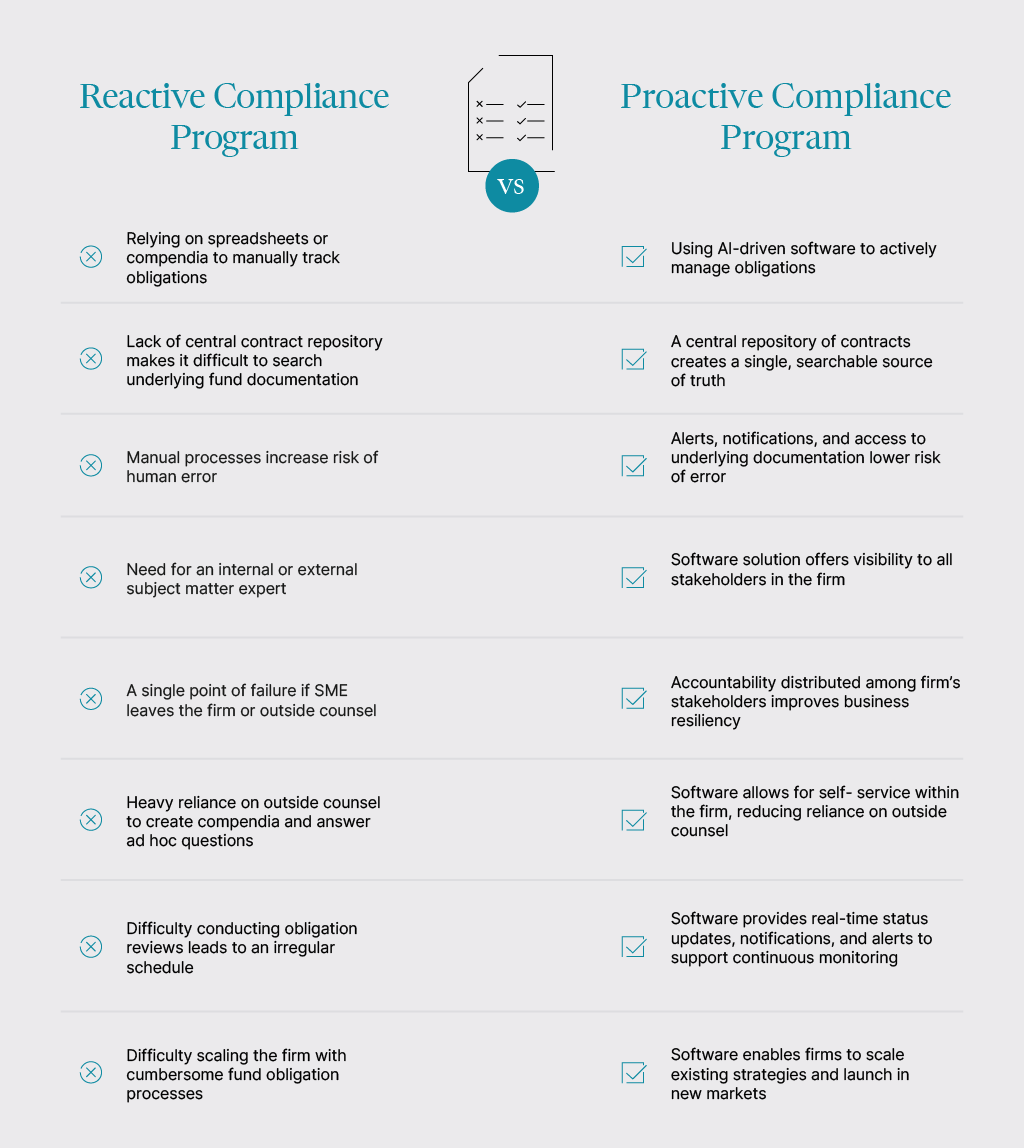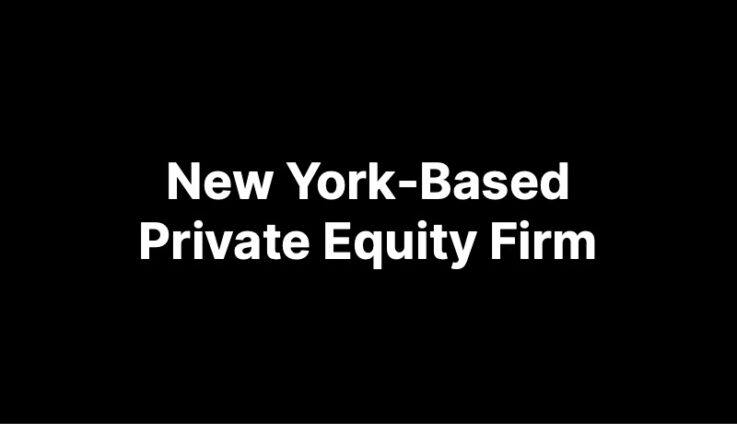In today’s regulatory climate, private fund advisers that rely on reactive fund compliance processes face a higher risk of noncompliance, inflated expenses, and reputational damage. Such reactive compliance programs involve inefficient workflows, addressing risks only when they surface, and conducting sporadic reviews.
This method not only jeopardizes compliance but also misses the opportunity to foster a proactive culture of adherence that can safeguard the organization’s integrity and standing in the industry.
While reactive processes may be the status quo in private markets, they’ve become too risky. Investors’ expectations are evolving along with enhanced scrutiny from the U.S. Securities and Exchange Commission (SEC). Firms maintaining reactive compliance programs could find themselves more likely to make a mistake, damaging their investor relationships and risking an enforcement action from the SEC.
A better strategy would be to use advanced legal technology to support proactive risk mitigation and continuous monitoring of all side letter terms and fund obligations. Learn how Insight, Ontra’s AI platform powering the private fund lifecycle, enables firms to build a proactive compliance program encouraged by the SEC.

What does a reactive compliance program look like?
Reactive fund compliance processes typically involve sending ad hoc questions to general counsels (GCs) or outside counsel and getting answers back typically takes a lot of time. Unfortunately, GCs and outside lawyers tend to have inconsistent methods for finding answers to firms’ questions. Or, when they have a workflow in place (such as referring to a compendium or spreadsheet), it’s still time-consuming and prone to human error.
This slow process is particularly costly for private fund advisers relying on outside counsel. Worse yet, firms with inefficient and redundant workflows might find themselves asking their GCs or external law firms the same questions repeatedly.
Reactive compliance processes also tend to involve firms tracking obligations irregularly. Firms might review side letter and other fund obligations quarterly, at most, or sporadically throughout the year. This review process (or lack thereof) increases the risk of noncompliance with an affirmative obligation.
Additionally, reactive firms often rely heavily on one internal or external subject matter expert (SME). This person might hold a wealth of knowledge regarding the firm’s investors and obligations, but the siloed nature of their expertise is detrimental to the firm’s overall compliance efforts. If that person left the firm, it could take weeks or even months for the firm to catch up. In the meantime, the firm might miss an important fund obligation.
The consequences of reactive compliance programs
Reactive compliance processes are inherently manual and slow and can lead to myriad compliance issues. Whether firms take up in-house lawyers’ time on repetitive tasks or rely on outside counsel, this cumbersome work is costly. Firms either pull their in-house teams away from higher-value work or pay significant invoices to law firms.
When firms rely on one spreadsheet or one person, they lack a centralized point of institutional knowledge available to all stakeholders. They create a singular point of failure, and one mistake could impact the firm’s reputation.
Firms also need to consider other potential costs of reactive processes. They could incur damages for breach of contract, harm their relationships with investors, and hinder future fundraising efforts. Of equal importance is their lack of preparation for a regulatory audit. Deficiencies could lead to SEC actions, fines, and further reputational damage.
Additionally, manual processes aren’t scalable as firms launch new funds and contract with more investors. A lack of streamlined processes to adhere to compliance requirements will most likely hamper expansion efforts.
SEC encourages proactive compliance
In October of this year, the Director of the SEC’s Enforcement Division, Gurbir S. Grewal, spoke to the New York City Bar Association’s Compliance Institute 2023 about his expectations for chief compliance officers (CCOs) of private funds and their firms’ compliance efforts.
Over the years, the SEC has struggled with clearly expressing its expectations for private funds’ compliance teams, according to Akin Gump Strauss Hauer & Feld LLP.* Director Grewal offered the SEC’s latest approach as he spoke about moving away from a “culture of compliance” to “proactive compliance.”
Whether or not a firm has a proactive compliance program depends on three factors:
- Education: CCOs must educate themselves and firm employees on relevant laws and regulations and “external developments relevant to your business,” such as new SEC examination priorities or enforcement actions.
- Engagement: CCOs must fully engage with stakeholders across their firm’s various business units and understand its business lines to accurately design and adopt compliance policies.
- Execution: CCOs must fully execute the compliance policies and procedures they put to paper. Grewal noted many firms faced enforcement actions resulting from a lack of implementation despite having policies and procedures in place.
How to build a proactive compliance program with Insight
To meet Director Grewal’s expectations for SEC compliance, private fund advisers need technology-enabled processes and procedures. With an industry-specific solution like Ontra’s Insight, firms can implement a single source of truth for fund documents, investor obligations, and investment restrictions.
With a centralized platform, firms can immediately involve all internal and external stakeholders in their compliance efforts instead of relying on a single SME or compendium. Insight also creates a self-service option. Stakeholders can find answers to questions themselves, or the firm’s in-house legal department can quickly find information through the AI-backed search feature.
With regard to monitoring and completing fund and regulatory obligations, Insight provides the ability to create singular and recurring tasks and subtasks, as well as alerts and notifications based on programmed triggers.
The benefits of proactive compliance with Insight
Insight reduces the number of manual, time-consuming, and costly compliance-related tasks and replaces them with streamlined workflows. Firms gain consistent access to fund documents across teams, strategies, and verticals. Stakeholders can take advantage of real-time status updates, automated notifications, and an AI-backed search function.
These features enable firms to rely on outside counsel less, reducing that expense. They also let in-house departments spend less time on ad hoc requests. Instead, GCs can focus on high-value, strategic tasks, ultimately improving productivity and morale. They have more time to drive value for the firm when repetitive tasks aren’t bogging them down.
When responding to an SEC (or mock) exam, a centralized platform for fund documents and compliance-related activities with task and subtask features can automatically create an audit trail. As a result, firms can quickly generate and export documentation to provide to the SEC, establishing the firm’s contractual and regulatory compliance efforts. And, given firms’ improved efforts, they’re less likely to receive deficiency letters or fines.
Finally, firms benefit from operational resiliency and a solid foundation to scale. Insight enables not only business continuity but also the ability to grow in the coming years. Private fund managers gain the technology and speed necessary to branch out into new markets and launch new strategies. They also can boost their reputation, using their tech-enabled, proactive compliance program as a selling point to conscientious investors.
*The law firms referenced in this article have no affiliation with Ontra, and neither Ontra nor such firms promote or endorse the other’s products or services.





